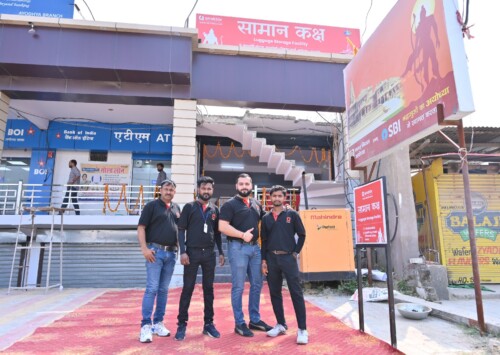Karnataka’s ordinance promises rights, recognition for gig workers
Welfare board, worker rights & mandatory registration in focus

Indian gig workforce is projected to grow from the current 7.7 million to 23.5 million by 2029-30 (Photo: Masrat Nabi)
India’s booming gig economy has long thrived on the backs of workers with little to no social security. In Karnataka, however, a new ordinance promises to change that. By introducing a welfare levy and protections for platform workers, the state has taken a major step toward formal recognition and dignity for the people powering its digital convenience economy.

Indian gig workforce is projected to grow from the current 7.7 million to 23.5 million by 2029-30 (Photo: Masrat Nabi)
In Yelahanka, a suburban locality in Bengaluru Urban district, 26-year-old Shiva Kumar has been delivering food for Swiggy for the past four years, often spending more than 12 hours a day zig-zagging through the city’s crowded roads on his bike. The work is demanding and relentless, offering no paid leave, no health benefits, and no guaranteed monthly income.
“It is a job with no guarantees. Every single day, I am out on the road for more than 12 hours and even then, I am never sure how much I will make. If I fall sick or if something happens to my bike, I do not earn anything. There is no backup, no health insurance, nothing to fall back on. The companies call us ‘delivery partners,’ but in reality, we are treated more like machines expected to keep working non-stop, no matter what, without any rights or support,” Kumar tells Media India Group.
India’s tech capital, Bengaluru, is estimated to have over 200,000 gig workers. These workers are associated with various delivery and service platforms and form a significant part of the city’s economy, just as in most metros around the country. From food delivery to cab services and logistics, their work sustains the digital convenience that urban consumers now rely on.
According to India’s Booming Gig and Platform Economy, a report by NITI Aayog, the former Planning Commission, the Indian gig workforce is projected to grow from the current 7.7 million to 23.5 million by 2029-30. The report highlights the sector’s vast potential to generate employment across blue, white, and grey-collar jobs, offering opportunities to a diverse pool of job seekers in both urban and semi-urban areas.
Also Read: No instant gratification for Q-com workers
However, this growth has come at the cost of the workforce, while the companies, ranging from Zomato and Swiggy to Blinkit and Dunzo, and their promoters, have done rather well for themselves, raising billions in premium-priced Initial Public Offerings (IPOs) and with more than generous compensation packages for the white-collar workforce.
But it is the blue-collar workers, who actually drive the companies, by picking up and delivering goods, often in ridiculously low and risky delivery times of a few minutes between order and delivery. And all of them are not even full-time employees, with a fixed income and with no social security cover, leaving them at the mercy of their corporate bosses and banking on prayers so that they and their vehicles, essential for deliveries, remain fit.
In case of an illness or an accident, these workers have no recourse to any insurance of any kind and they can only hope to start earning when they get back on their feet.
However, recent developments in Karnataka have brought a glimmer of hope to workers like Kumar. On April 11, the Karnataka Cabinet cleared the Karnataka Platform-based Gig Workers (Social Security and Welfare) Bill, which aims to offer much-needed social security and welfare benefits to platform workers. Once implemented, this legislation could make Karnataka the second state in India, after Rajasthan, to introduce formal welfare programmes for gig workers. The bill proposes a welfare fee on each transaction, depending on the platform’s size and business nature, which will contribute to a fund dedicated to workers’ health, safety, and overall welfare.
Also Read: Discover untouched beauty of river cruise in Karnataka
The ordinance proposes a differential welfare levy, a fee ranging from 1 pc to 5 pc of the commission paid to gig workers, which will vary depending on the size and nature of the platform’s business. These funds will be allocated to finance social security schemes for gig workers, ensuring they receive essential benefits. Furthermore, a Gig Workers Welfare Board will be established to oversee the registration of workers, manage fee collection and implement welfare programmes. This initiative aligns with a promise made by the Leader of Opposition in Lok Sabha Rahul Gandhi, a prominent Congress leader, during his Bharat Jodo Yatra, where he vowed to support gig workers by ensuring the establishment of a welfare board similar to that of construction workers.
The ordinance also brings several significant obligations for platforms and protective measures for gig workers. One of the key requirements is the Obligation to Register, where platforms must register all gig workers with the Welfare Board within 45 days of the law taking effect. Additionally, consistent reporting is mandated and platforms must provide workers with detailed reports on payments and deductions for benefits through a standardised reporting system, accessible at any time by the workers. Platforms will also be required to provide uniform contracts, ensuring that all terms, conditions, and workers’ rights are clearly outlined and understood.
Regarding protections for termination, the ordinance prescribes that workers must receive written notice in the event of termination, with a 14-day notice period unless the termination is due to serious misconduct involving bodily harm. The ordinance further mandates that platforms provide safe working conditions, including appropriate breaks and access to washrooms. In case of disputes, the resolution of issues will begin with an internal grievance body within the platform, and if unresolved within 14 days, the issue will escalate to the Welfare Board or a formal grievance resolution body.
Also Read: From Bean to Brew: Coffee story of Karnataka
“It is encouraging to finally see the government acknowledging the struggles that we, as gig workers, have faced for so long. For years, we have been working day in and day out, but we have remained invisible in the eyes of the law and society. We have had no real support system, no safety net to rely on when things go wrong. The introduction of this Bill is a step in the right direction, but it is only the beginning. We have been promised many things before, and I don’t want to get my hopes up just yet. What we truly need are concrete protections things like health insurance, paid leave, and a guaranteed, fixed income, so we are not living paycheck to paycheck. Without these, we are always just one setback away from financial ruin. This is not just about a law; it is about ensuring we can survive and live with dignity while doing the work that the entire city depends on,” says Kumar.
While the ordinance promises crucial safeguards for workers, it also introduces increased compliance costs for larger platforms such as Uber, Ola, and Zomato. These companies have previously expressed concerns that such regulatory requirements could drive them toward greater automation, impose stricter worker onboarding processes, or result in higher service prices challenges that the ordinance does not directly address. Moreover, there is uncertainty regarding how Karnataka will enforce compliance, particularly with national platforms that operate across multiple states, raising concerns about fragmented regulatory obligations.
The solution to the imbroglio may lie in the federal government paying heed to the fate of the tens of millions of these workers and frame a nationwide law mandating companies to contribute to the social security of their workers, the wheels that drive them forward.









